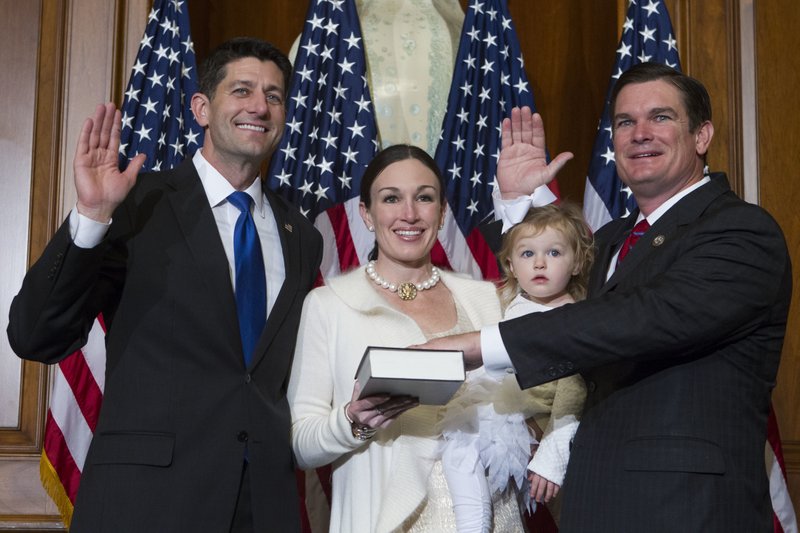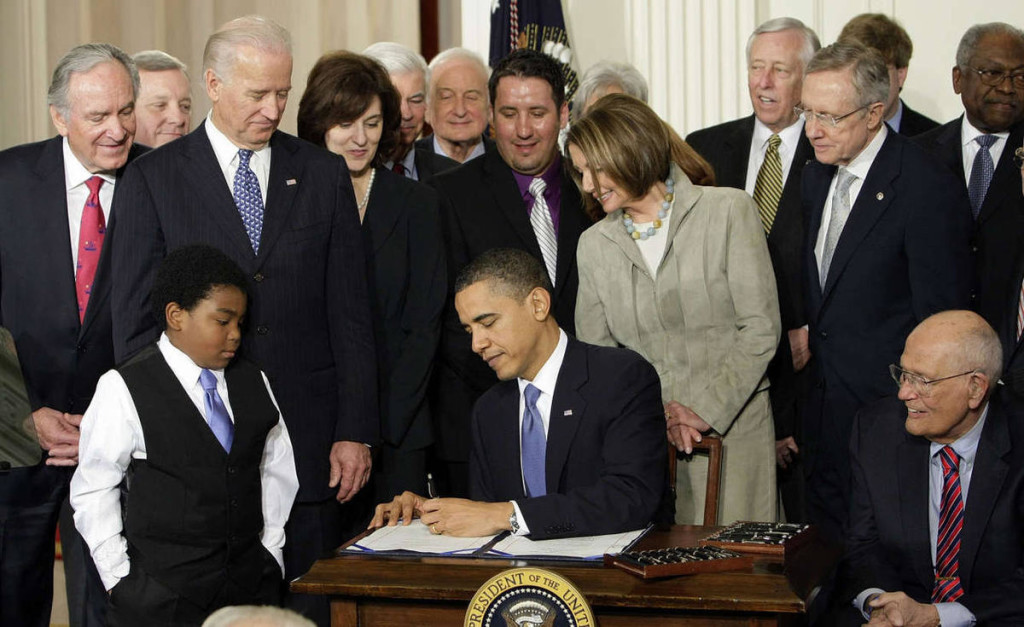How moving to Ala. took me from ‘right-wing nut job’ to ‘Republican in name only’

I know a woman’s not supposed to reveal her age, but at 37 I’ve been in and around the political process for about 15 years now. The first several years were mainly observational and administrative. From there I was able to get a real feel of things on the campaign trail, as a lobbyist, and then with various non-profit issue advocacy organizations. These groups are where I found my passion in grassroots advocacy. This included speaking to groups large and small all around the nation about what’s going on from the local to the federal levels. I’ve been fortunate to work with a handful of incredible elected officials and with hundreds of passionate grassroots advocates. I was honored to be a part of the true Tea Party movement when it first began. I attended rallies. I waved signs and banners. I took too many bus rides, to both state and national capitols, to count. I’ve worked two election cycles as a field rep for the National Rifle Association’s campaign arm, NRA-ILA, electing Second Amendment supporters, and two Koch-backed groups including the largest grassroots organization in the country, American’s for Prosperity, as well for 60 Plus Association. With a resume like that you can only imagine the names I’ve been called personally and on a whole for the company I keep and the things I believe. From “right-wing nut job” to “Tea Party crazy,” I’ve heard it all. Nearly every time I write an opinion column liberal or progressive commenters have a fit about how conservative I am sometimes I’m even too conservative for republicans or libertarians. For those who don’t know me well and have never seen me in person, know that I have a full color Republican elephant tattooed on my foot. True story. I was young and it was ridiculous, but it’s there and it is what it is. So it’s funny to me (that is more ironic funny, than ‘haha’ funny) that since moving to Alabama and speaking out against the status quo here — simply pressing for answers and better behavior from those who most Republicans in the state never dare question — I have had my allegiance to the true conservative principles, to which I’ve dedicated my life, questioned. I’ve suddenly found myself being called a RINO or Republican in name only in whisper campaigns and in comments and conversations others have had with friends and acquaintances. It seems to be happening more often these days as well so let me set the record straight about who I really am: I’m a pro-life Catholic. I’m a mother. I’m a second amendment supporter. I’m a small business owner. I’m a fiscal conservative. I’m libertarian on most social issues (including legalization of marijuana and getting the government out of the marriage business). I believe in school choice including vouchers and charter schools. I believe less government is always preferable to the alternative. I think we should sunset most laws so they have to be revisited and not just stay on the books indefinitely. I don’t support term limits in congress – we have elections for that. I think business licensing is usually a way for the government to get money not protect consumers. I believe that the goodness of people and churches could and should fulfill most of the safety net programs that the government pays for. I want secure borders and our immigration system to be fixed to improve the process for qualified individuals. I believe in criminal justice reform but I also support the death penalty. Here’s what seems to upset the establishment republicans here in AL: I want accountability and transparency from our elected officials all of them, regardless of party. The fact is, everyone should. I started ticking-off the establishment when I first spoke out against then Speaker Mike Hubbard during his tenure and trial. Lately it’s only gotten worse as I’ve spotlighted my concerns with staff and transparency in Governor Kay Ivey’s office. (Still wondering why they can’t/won’t just provide a list of gubernatorial appointees like Robert Bentley’s office did within hours. Mind boggling I tell you. Can someone please get her a new Communications Director who understands how to do their job?) I’ve really been hard on John Cooper over at ALDOT for his lack of transparency and accountability in how his department has handled a bridge down in Baldwin County. I ticked-off a member of our congressional delegation when his staff tried to get me not to run a valid story decrying it as “Fake News” because they didn’t want it reported on and I both ran the story then wrote an op-ed about the ridiculous use of “Fake News” to decry news stories a subject doesn’t like. I could go on and on about the ways in which I’ve shown myself to be a traitor to the Party, but you get the point. Never mind that I’ve also called attention to the severe problems with policies like the minimum wage increase Birmingham City passed, have wondered out loud about the status of the city as a sanctuary or friendly city, I’ve questioned the fact Mayor Randall Woodfin needs to focus on crime not magazine covers, and that Mayor William Bell before him was wasting a lot of money on his personal security detail. I’ve pointed out Walt Maddox doesn’t stand a chance in the governor’s race. Regardless of party and and position we need to be questioning those who represent us. Our responsibilities as active citizens doesn’t end when we vote or go to the polls. We have to do more. We have to follow what our elected officials and their staff are doing and follow them more closely than how they present themselves on social media or in press releases we have to question more than the talking points they or their staff give us. Donald Trump is a great example of the type of Republican that leaves someone like me scratching their heads. There have many moments, both in
Tea party groups get $3.5 million payout in settlement with IRS

A judge gave final approval on the settlement between the Internal Revenue Service (IRS) and hundreds of tea party groups groups across the country. The decision closes the class action suit, which lasted more than five years, that alleged the IRS illegally targeted the conservative groups when applying for tax-exempt status during the 2012 election. The IRS agreed to pay $3.5 million to the disgruntled, targeted groups. “It shows that when a government agency desires to target citizens based on their viewpoints, a price will be paid,” said Edward Greim, a lawyer who led the class-action case in federal court in Cincinnati, according to the Washington Times. Judge Michael R. Barrett deemed the settlement “fair, reasonable and adequate.” History of IRS targeting tea party groups Republicans were outraged in 2013 when the IRS admitted the targeting, in part by zeroing in on groups with words such as “tea party” or “patriot” in their names. Many had their applications delayed for months and years. Some were asked improper questions about their donors and even their religious practices, an inspector general’s report found. The Obama Justice Department announced in 2015 that no one at the IRS would be prosecuted. It said investigators found mismanagement but no evidence that the tax agency had targeted a political group based on its viewpoints or obstructed justice.
The end of an era? Tea party class of House Republicans fades

The Republican newcomers stunned Washington back in 2010 when they seized the House majority with bold promises to cut taxes and spending and to roll back what many viewed as Barack Obama’s presidential overreach. But don’t call them tea party Republicans any more. Eight years later, the House Tea Party Caucus is long gone. So, too, are almost half the 87 new House Republicans elected in the biggest GOP wave since the 1920s. Some, including current Secretary of State Mike Pompeo and White House budget director Mick Mulvaney, joined the executive branch. Others slipped back to private life. Several are senators. Now, with control of the House again at stake this fall and just three dozen of them seeking re-election, the tea party revolt shows the limits of riding a campaign wave into the reality of governing. Rep. Austin Scott, R-Ga., who was president of that freshman class, objects to the tea party brand that he says was slapped on the group by the media and the Obama administration. It’s a label some lawmakers now would rather forget. “We weren’t who you all said we were,” Scott said. He prefers to call it the class of “small-business owners” or those who wanted to “stop the growth of the federal government.” Despite all those yellow “Don’t Tread on Me” flags and anti-Obama health law rallies, Scott said the new Republican lawmakers wanted to work with the president, if only Obama would have engaged them. “We didn’t come to take over the country,” he said. Yet change Washington they did, with a hard-charging, often unruly governing style that bucked convention, toppled GOP leaders and in many ways set the stage for the rise of Donald Trump. By some measures, the tea party Republicans have been successful. The “Pledge to America,” a 21-page manifesto drafted by House Republican leadership, outlined the promises. Among them: “stop out of control spending,” ″reform Congress” and “end economic uncertainty.” They forced Congress into making drastic spending cuts, in part by threatening to default on the nation’s debt, turning a once-routine vote to raise the U.S. borrowing limit into a cudgel during the annual budget fights. Republicans halted environmental, consumer and workplace protection rules, and that rollback continues today. Perhaps most notably, the GOP majority passed $1.5 trillion in tax cuts that Trump signed into law, delivering on the tea party slogan penned on so many protest signs: “Taxed Enough Already.” But former Rep. Tim Huelskamp, R-Kan., said the “most egregious failure” was the GOP’s inability to undo the Affordable Care Act, Obama’s signature domestic achievement. Huelskamp said the class never really stuck together. When he arrived that first week in Washington in January 2011, he was stunned to find the leadership slate already set with then-Rep. John Boehner, R-Ohio, as speaker-in-waiting, facing little resistance. “That was a sign: The establishment in Washington was happy to have our votes, but not to follow our agenda,” said Huelskamp, who lost a primary election in 2016 to a political newcomer and now runs the conservative Heartland Institute. It was “just a clear misunderstanding of what the people wanted.” Over time, budget deals were struck with Democrats, boosting spending back to almost what it was before the revolt. Combined with the tax package, the GOP-led Congress is on track to push annual deficits near $1 trillion next year, as high as during the early years of the Obama administration when the government struggled with a deep recession. Maya MacGuineas, president at the Committee for a Responsible Federal Budget, said Republicans talked a good game promising to balance the budget, but with control of Congress — and now the White House — they failed to tackle the tough tax-and-spending challenges needed to get there. “That’s a whole lot of talk and zero follow through,” she said. Other proposals to improve transparency in government — a pledge to “read the bill” and post legislation three days before votes — remain works in progress. House bills are typically made public, but sometimes just before midnight to conform with the three-day rule. Frustrations within the ranks grew, and the new class splintered. Not all of them had been favorites of their local tea party groups. Some joined other conservatives to form the House Freedom Caucus, which nudged Boehner to early retirement in 2015. Former Florida Rep. Allen West, among the more prominent class members who lost re-election and is now a Fox News contributor living in Texas, said the challenge for House Republicans heading into the fall election is, “Who are they? What do they stand for?” House Republicans are wrestling with a midterm message at a pivotal moment for a party that Boehner says no longer exists. “There is no Republican Party. There’s Trump’s party,” Boehner said at a recent policy conference in Michigan. Boehner’s successor as speaker, Rep. Paul Ryan, R-Wis., also is stepping aside. He was a conservative up-and-comer long before the tea party, but has run into many of the same challenges Boehner faced in managing a fractured majority. He will retire after this term. In fact, there are an unusually high number of House Republicans retiring this year, including nearly a dozen from the tea party class. Several are running to be governors or senators, though some have already lost in primaries. Others, including Rep. Trey Gowdy, R-S.C., another rising star, are simply moving on. Some resigned this year amid ethics scandals. Jenny Beth Martin, a co-founder of Tea Party Patriots, says every movement “goes through phases.” As the group looks to elect the next “Tea Party 100″ members of the House, it’s seeking “tested and proven” candidates beyond the “citizen legislators” who powered the early days. Another 2010 leader, South Carolina’s Tim Scott, now a senator, says he has no problem with the tea party label that’s now etched in history. But he reminds his colleagues as they campaign that to keep the majority they must also eventually govern and that “promises made should be promises kept.” Republished
Facing heat at home, GOP leaders may rescind some spending

As Republicans run into a buzz saw of conservative criticism over a deficit-expanding new budget, GOP leaders and the White House are looking for ways to undo the damage by allowing President Donald Trump to rescind some of the spending he signed into law just 10 days ago. Rolling back the funds would be a highly unusual move and could put some lawmakers in the potentially uncomfortable position of having to vote for specific spending opposed by a president from their party. But it would also offer Republicans a way to save face amid the backlash over the bill that conservatives, and Trump himself, complain gives too much money for Democratic priorities. Trump has been talking with House Majority Leader Kevin McCarthy, R-Calif., about the plan over the past couple of days, according to an aide to the House leader who spoke on condition of anonymity to discuss the private talks. It is not clear how widely the idea has been embraced by other top Republicans, including House Speaker Paul Ryan or Senate Majority Leader Mitch McConnell, whose offices declined to discuss it. “There are conversations right now,” said Matt Sparks, a spokesman for McCarthy. “The administration and Congress and McCarthy are talking about it.” The idea emerged as lawmakers get hammered back home for the $1.3 trillion spending package that, while beefing up funds for the military, also increases spending on transportation, child care and other domestic programs in a compromise with Democrats that Trump derided as a “waste” and “giveaways.” Trump’s decision to sign the bill into law, after openly toying with a veto, has not quelled the unrest and may have helped fuel it. “People are mad as hell about it and mad as hell that they put the president in that situation — that he sign the bill or shut the government down,” said Amy Kremer, a founder of the tea party and co-chairman of Women for Trump. Kremer said Republicans in Congress have lost sight of the voters who propelled them to the majority on an agenda of fiscal restraint. “They are no better than the Democrats,” she said. Lawmakers home on spring recess are feeling the brunt of the criticism. Rep. Mark Amodei, R-Nev., said he encountered a finger-wagging voter back home almost as soon as he stepped off the airplane. Fox News host Sean Hannity asked, “What happened to the Republican Party?” after Trump signed the bill. “Republicans should be ashamed of themselves,” he added. In some ways, the rescission proposal is as close as Trump can get to the line-item veto, which he called on Congress to enact even though the Supreme Court decided in 1998 that it would violate the authority the Constitution gives Congress on legislation. The idea centers on a rarely used provision of the 1974 Congressional Budget and Impound Control Act. It allows the White House to propose rescinding funds and sets a 45-day clock for the House and Senate to vote. Congress could simply ignore the president’s request and keep the funds in place. Sparks didn’t specify how much spending could be rescinded or in what categories. But Trump would likely seek to focus on domestic spending he has attacked in recent tweets. Trump has been particularly upset the package did not include $25 billion he sought for the border wall with Mexico, even after the bill burst through previously set budget caps for military and domestic spending. Ryan and Trump have not yet talked this week, an aide to the speaker said, but likely will by week’s end. Voting, though, could be difficult, even for fiscally conservative Republicans, since Trump’s targets may be popular projects or programs back home, said Gordon Gray, the director of Fiscal Policy at the center-right American Action Forum, who notes the rescission tool is not as popular as it was when introduced in the Nixon era more than 40 years ago. Passage would not be certain, especially in the Senate, where Republicans hold a slim 51-49 majority. Republished with the permission of the Associated Press.
Tea party groups settle lawsuits over IRS mistreatment

The Trump administration has agreed to what a lawyer described as a “very substantial” payout to hundreds of tea party groups to settle a class-action lawsuit over the extra, often burdensome IRS scrutiny they received when applying for tax-exempt status during the 2012 election. The settlement would end a chapter in a political scandal that dogged the Obama administration and continues to irk Republicans. In settling the case, the Trump administration is agreeing to government payments to groups that share its political beliefs. The conservative, anti-establishment tea party movement was something of a precursor to Donald Trump‘s populist, America-first presidential campaign. Announced Thursday, the settlement still needs a judge’s approval. Eddie Greim, a lawyer representing more than 400 groups in a class-action suit, described the financial settlement as generous but would not elaborate because details remained sealed Thursday. The Justice Department made no reference to a payout in its announcement. The department said it is settling a second lawsuit with an apology from the IRS for the intensive scrutiny of the groups, which argued their constitutional rights were violated when they were singled out based on their political views. Republicans were outraged in 2013 when the IRS admitted the targeting, in part by zeroing in on groups with words such as “tea party” or “patriot” in their names. Many had their applications delayed for months and years. Some were asked improper questions about their donors and even their religious practices, an inspector general’s report found. The Obama Justice Department announced in 2015 that no one at the IRS would be prosecuted. It said investigators found mismanagement but no evidence that the tax agency had targeted a political group based on its viewpoints or obstructed justice. Republicans were disappointed again when the Trump Justice Department, under Attorney General Jeff Sessions, said it would not reopen its case against Lois Lerner, who had led the IRS office that processes applications for tax exempt status. Still, Sessions condemned the misconduct in a statement announcing the settlements. “There is no excuse for this conduct,” Sessions said. “Hundreds of organizations were affected by these actions, and they deserve an apology from the IRS. The groups that sued were “very pleased” with the settlement outcome, Greim said. “It’s a great day for the First Amendment and the promise of a fair and impartial government,” he said in a statement. “But this day was too long in coming.” Much of the agency’s leadership, including Lerner, resigned or retired over the scandal. One of the proposed agreements calls senior management “delinquent” in providing control and direction over the process. It faults Lerner for failing to tell upper-level management of the long delays in processing applications from tea party and other conservative groups. “These cases against the IRS shouldn’t have happened in the first place,” Sessions said during a speech at the Heritage Foundation. “They never would have been necessary if government had acted properly.” Republished with permission from the Associated Press.
Alabama Patriots Tea Party group endorses Mo Brooks for U.S. Senate

Alabama 5th District U.S. Rep. Mo Brooks is facing a sea of Republican challengers in the upcoming GOP primary for the U.S. Senate special election. In an effort to bolster the Congressman’s conservative support and help him stand apart from the crowd, the Alabama Patriots Tea Party, one of the oldest Tea Party groups in the Yellowhammer State, announced its endorsement of Brooks over the 10 other GOP candidates, including incumbent Sen. Luther Strange on Tuesday. The endorsement comes two weeks after Brooks announced his candidacy, and following a thorough interview with the Commander of the Alabama Patriots, Danny B. Joyner. “In these trying times we believe God has provided men of honor and integrity to stand in the gap for our beloved Alabama and our Christian nation,” said Joyner. “Congressman Mo Brooks is the man to replace our friend and fellow Patriot Jeff Sessions as the next United States Senator from Alabama.” Joyner continued, “As critical to our nation as the choice of Neil Gorsuch was to replace Justice Antonin Scalia on the Supreme Court, we the Alabama Patriots feel it is just as critical to support and elect Mo Brooks to the U.S. Senate. His record needs no defending when it comes to the foundational building blocks of our republic in matters of our faith, family and freedom.” Joyner says Brooks stand apart from the other candidate for two reasons: he’s is the only candidate in the race with a proven record of conservative leadership who is renowned for standing up against special interests and Washington insiders. And according to Joyner, Brooks’ “impeccable ethics record stands out.” “Not once has a valid or even an invalid, politically motivated ethics complaint been filed against Mo Brooks with the Alabama Ethics Commission or any federal government ethics agency during Mo Brooks’ thirty years of public service as a Tuscaloosa Assistant District Attorney, Circuit Court law clerk, Madison County District Attorney, Alabama legislator, Madison County Commissioner, and U.S. Congressman,” Joyner added. “Mo Brooks’ proven, impeccable ethics record is exactly what Alabama needs in the U.S. Senate.” Brooks said he was honored by the endorsement. “I am honored to have the Alabama Patriots endorsement for the United States Senate,” Brooks expressed. “I am running for the United States Senate because America’s status as the greatest nation in world history is at risk, because Congress is failing the American people, and because I am the only candidate for the Senate who has a record of proven conservative leadership.” Brooks continued, “Having the support of the Alabama Patriots is a boon to my bid for the Senate. As a Constitutional conservative, I will defend Americans’ First Amendment Right to freedom of religion. As a father and grandfather, I will fight in the Senate to leave my children and grandchildren a financially sound nation where they can prosper, and as a strong defender of freedom, I stand firmly against increasing the size of the federal government. “As my past record proves, I have and will fight in the United States Senate to protect and promote faith, family, freedom and our foundational principles that have combined to make America the greatest nation in world history. As I have shown in the past, I have no hesitancy standing up against special interests and Washington insiders who put their own self-interests above America’s interests.”
Email Insights: Rainy Day Patriots’ to host open candidate forum Thursday 7/21

Birmginham area residents are invited to an open candidate forum at the Red Lobster in Vestavia Hills Thursday night hosted by the Rainy Day Patriots (RDP) tea party group. Run by Birmingham RDP leader Dawn Ray, the forum will feature candidates from the upcoming municipal elections for mayor and council, and is open to the local candidates, RDP members as well as guests. The upcoming election will be held Aug. 23, and a runoff, if necessary, will be held Oct. 4. View the invitation below: Dear Friends: To: Local Candidates, RDP Members, and Guests What: Rainy Day Patriots’ Open Candidate Forum Where: Red Lobster, 1030 Montgomery Hwy, Vestvia Hills 35216 Date: Thursday, July 21st Time: Meeting begins at 6 p.m. Feel free to come earlier to eat. RSVP: Not required. Time allotted for candidates determined by number candidates who show up.
Jac VerSteeg: Political fratricide model fails Marco Rubio

Marco Rubio was convinced the Fratricide Model of politics was his ticket to the top. Now, after one brilliant win and one spectacular loss, the Florida senator claims to have renounced the model. He will not, he says, run for governor in 2018. Florida Agriculture Commissioner Adam Putnam need not fear a Rubio challenge. We won’t have Marco Rubio to kick around anymore? Political fratricide worked for Rubio in 2010 when he broke in line to oppose and defeat Gov. Charlie Crist for a U.S. Senate seat. He was helped along by that year’s Tea Party revolt and the fact that newly Independent Crist and Democrat Kendrick Meek split the no-to-Rubio vote. Just as angry as the 2010 Tea Party faithful but with a new idol, Florida GOP primary voters this month delivered the final blow to Rubio’s second attempt at exploiting the Fratricide Model. They gave Donald Trump a victory in every county except Rubio’s Miami-Dade refuge. What effect did Rubio’s fratricidal challenge to his mentor (and his better) Jeb Bush have on the contest? What if Rubio had shown respect, bided his time and supported Bush? No way to know, but Florida might have been the firewall for Bush and the anti-Trumpers that it so dismally failed to be for Rubio. I do not think that every intra-party challenge can be characterized as an example of the Fratricide Model. It’s appropriate for rivals in the same party to let voters decide between them. But when one of the challengers has not earned the right to vie for an office and, further, damages the party or the office he seeks, that is political fratricide. And that is what Rubio has done. He knocked off Crist – once a Republican rising star – and proceeded to disdain the Senate seat he won. As a result, the seat easily could go to a Democrat this November. Then, of course, Rubio challenged Jeb. After helping to undermine the clear choice of the GOP establishment, Rubio proceeded to run a horrible campaign. The overall effect boosted Trump’s prospects and hurt the Republican Party. What will Rubio do next? He claimed, upon returning to work in the Senate – if someone so often a no-show can be said to “return to work” – that, in addition to eschewing a gubernatorial bid, he would not be anybody’s veep. You never know what to make of a politician’s claim that he won’t seek this or that office. How many times did now-House Speaker Paul Ryan claim that he would not accept the post? (By the way, Ryan also insists he won’t allow himself to be nominated at a fractured GOP convention this summer. Right.) For Rubio, who has been assailed for overweening ambition, what better strategy than to affect a new humility and express no ambition whatsoever for political office? Is it really believable that if, by some miracle, he emerges as a vice presidential candidate – perhaps for Ryan at a brokered convention – Rubio would turn down the chance? It is more believable that Rubio does not plan to run for governor in 2018. Not because he doesn’t lust after political office, but because he was so badly burned this year by the Fratricide Model. Even Rubio should be able to see that he is less qualified and less deserving than the premier GOP candidate for the job, Putnam. Putnam served in the Florida Legislature and then went on to serve in Congress for 10 years. Unlike Rubio, Putnam actually performed his job diligently and rose to be the third-highest ranking Republican in the U.S. House. Then, rather than stay in a secure seat in federal office, Putnam chose to return to state politics and has been elected and re-elected as Ag commissioner. It is worth emphasizing that Putnam’s chosen trajectory brought him voluntarily back to Florida. Rubio’s chosen path was to attempt to move into the White House. Only a failure to reach that goal could bring him the “consolation prize” of a gubernatorial campaign. And even if he were elected governor, he would just treat it as a stepping stone back onto the national stage. Could Rubio beat Putnam? Considering his drubbing on the Ides of March, the likely answer is no. His decision not to run for governor easily could be a case of sour grapes rather than an example of his newfound humility. Since Rubio decided to give up his Senate seat, it is hard to see any political path that puts him back on that stage. His best option? Hope that anybody but Trump wins and that Rubio could find a spot in a Ted Cruz or John Kasich administration and bide his time. But does anyone think that if Rubio saw a chance to return to political prominence he would hesitate to seize it even if it meant running over one of his Republican brethren? Oh, brother. *** Jac Wilder VerSteeg is a columnist for The South Florida Sun Sentinel, former deputy editorial page editor for The Palm Beach Post and former editor of Context Florida.
Ben Pollara: A Democrat’s unsolicited advice for the GOP that created Donald Trump

What is more appealing for Democrats like me? Donald Trump as the Republican nominee, or a fractured convention that produces a nominee who received no Republican primary votes, like Paul Ryan? Honestly, both sound pretty good and likely to culminate in a Hillary Clinton presidency. But it’s not up to Democrats like me, and the questions Republicans should be asking themselves have more serious consequences for both their party and our system of governance. Beyond my partisanship, I hold a core belief in the essential function of the two-party system and the imperfect, yet better than the alternatives, manner in which it maintains the values of our republican democracy. Assuming Trump enters Cleveland with a plurality but not majority of delegates, to deny him the nomination would shatter the Republican Party for a decade to come, and with it the two-party system that balances the most extreme tendencies of American political ideology. The media reacted with shock at Trump’s assertion that a brokered convention that denied him the nomination would lead to rioting. Trump has said many outrageous things, many of them without basis in fact. This was not one of them. Just as Vietnam and Civil Rights nearly tore apart the Democratic Party in 1968, denying Trump the nomination through Byzantine delegate rules would succeed in doing the same to the Grand Old Party. The party of Lincoln must come to terms with the reality that it now holds that moniker by historical fact only. The Republican Party has, by virtue of a political strategy to build a winning national coalition post-New Deal, become the party of Richard Nixon, Ronald Reagan, and yes, Donald Trump. To survive, Republicans must face down that which they have wrought through two generations of “dog whistle” racism and us-vs-them fearmongering that, until recently, served the cynical corporatists and political elites in the party quite well. The Southern Strategy and the rise of fundamentalist religious extremism paved the way for the K Street Project and 20 of 28 years of Republican White House occupancy; the Tea Party and Birtherism gave rise to the Koch-era and hegemony of the legislative branch in D.C. and most state capitols. But the craven decisions that led to these triumphs are causing the Republican Party to collapse under the weight of its own base. What fueled government shutdowns over previously benign issues like raising the debt ceiling and funding Planned Parenthood (and the ultimate ouster of John Boehner as Speaker of the House) is precisely what is fueling Donald Trump’s success. It is willful ignorance and intellectual dishonesty of the first degree for Republicans to bemoan the “Make American Great Again” movement and its accompanying rhetoric of angry xenophobia without owning responsibility for creating the environment that spawned it. You reap what you sow. Give Trump the nomination he has earned; you fostered the environment that incubated him. Let Trump fail spectacularly in November. Then look in the mirror and begin to rebuild the Republican Party in the image of Abraham Lincoln, rather than David Duke and his ilk. The alternative is a splintering of the very foundation of our political system and a generation of Democratic hegemony, which may have pundits in the not distant future bemoaning that “Barack Obama wouldn’t have been able to win a single state’s primary in today’s Democratic Party. He was basically a Republican.” Republicans should ask themselves, what is scarier? Four more years of a Democrat in the White House, or a future where that statement is true? • • • Ben Pollara is a political consultant and a founding partner of LSN Partners, a Miami Beach-based government and public affairs firm. He runs United for Care, the Florida medical marijuana campaign and is a self-described “hyper-partisan” Democrat.
Seeds of GOP splinter in opposition to all things Barack Obama

Republicans can blame their united stand against President Barack Obama for their party’s splintering. Conservatives’ gut-level resistance to all things Obama — the man, his authority, his policies — gave birth to the tea party movement that powered the GOP to political success in multiple states and historic congressional majorities. Yet contained in the movement and its triumphs were the seeds of destruction, evident now in the party’s fracture over presidential front-runner Donald Trump. Obama’s policies, from the ambitious 2010 law overhauling the health care system to moving unilaterally on immigration, roiled conservatives who decried his activist agenda and argued about constitutional overreach. “Quasi-socialist,” says Tea Party Express. Republicans rode that anger to majority control of the House in 2010 and an eye-popping net gain of 63 seats as voters elected tea partyers and political outsiders. Four years later, the GOP claimed the Senate, too. For all the numbers, though, Republicans were unable to roll back Obama administration policies or defeat the Democratic president in 2012, further infuriating the GOP base. Now the party of Abraham Lincoln is engaged in a civil war, pitting establishment Republicans frightened about a election rout in November against the unpredictable Trump, who has capitalized on voter animosity toward Washington and politicians. “There would be no Donald Trump without Barack Obama,” said Sen. Lindsey Graham, R-S.C. No fan of Trump, Graham argued that resentment of Obama plus his own party’s attitude toward immigrants are responsible for the deep divide and the billionaire businessman’s surge. Mainstream Republicans are hard-pressed to figure out a way forward with Trump, who has pledged to build a wall on the Mexican border, bar Muslims from entering the United States and equivocated over former Ku Klux Klan leader David Duke‘s support. The candidate has assembled a growing coalition of blue-collar workers, high-school educated and those craving a no-nonsense candidate. “I think they are at a loss to try to reconcile this nihilist wing of the Republican Party with conservative principles,” said Sen. Dick Durbin of Illinois, the No. 2 Democrat in the Senate. The health care fight proves illustrative. The disaffected Americans embracing Trump echo the angry voices that filled town halls in the summer of 2009 as fearful voters taunted lawmakers over efforts to overhaul health care. Obama and Democrats were undaunted, pushing ahead on a remake of the system despite unified Republican opposition. In January 2010, thanks to tea party backing and conservative outrage, Republican Scott Brown won a special election in Massachusetts, claiming the seat that liberal Sen. Ted Kennedy had held for 47 years. That sent people a message that “if you could win in blue Massachusetts, we could win in my state,” said Sal Russo, co-founder and chief strategist of Tea Party Express. “That changed the movement from a protest movement to a political movement.” Three months later, in March 2010, Democrats rammed Obama’s health reform through Congress as mobs of protesters chanted outside the Capitol. Not a single Republican backed it. “Completely partisan,” said Sen. John Barrasso, R-Wyo. That November, the tea party propelled Republicans shouting repeal health care to victory, among them Sens. Marco Rubio of Florida and Rand Paul of Kentucky. They defeated establishment GOP candidates more likely to compromise in Washington. Dozens of other tea party candidates captured House seats; many were making their first foray in politics. Losers in 2010 were some of the moderate and conservative Democrats who had backed the health care law. Along with Obama’s re-election in 2012 came another group of congressional tea partyers, including Sen. Ted Cruz of Texas. The movement’s strength ran headlong into Washington reality: Obama was president and Democrats still controlled the Senate. Efforts by Cruz and House conservatives to torpedo the health care law led to a partial, 16-day government shutdown in 2013. Republicans triumphed a year later, capturing control of the Senate and knocking out some of the more moderate Democrats such as Louisiana’s Mary Landrieu and Arkansas’ Mark Pryor. In the House last year, they toppled House Speaker John Boehner, R-Ohio, a victim of his pragmatism. Expectations among uncompromising conservatives were sky-high. So was the disappointment. Obama’s health care plan remained the law of the land. “It definitely led to a wave in 2010 that gave us the majority, and then, what have we done since then,” said Rep. Dennis Ross, R-Fla. “That’s our responsibility to show what we have done since then, in spite of this president.” Trump has tapped into voter frustration even though he’s not considered tea party. At the Conservative Political Action Conference on Friday, Jenny Beth Martin, co-founder of Tea Party Patriots, made clear that their man was Cruz. Still, Republicans recognize the power of his candidacy and the ramifications. “The American people are fed up,” said Rep. Tom Marino, R-Pa., one of a handful of Trump backers in Congress, “and if elected officials don’t realize it, we’ll be out of jobs.” Republished with permission of the Associated Press.
No surprise: Tea Party activists prefer Ted Cruz over Jeb Bush

Senator Ted Cruz of Texas was the hands-down favorite of an Americans for Prosperity gathering this weekend, if the number and volume of ovations during the speeches of five presidential candidates who addressed the summit of Tea Party activists was the measure. At the other end of the spectrum was former Florida Governor Jeb Bush, a newcomer to events financed by conservative industrialists Charles and David Koch. Bush was attending his first national conference of Americans for Prosperity and was greeted with respectful but restrained applause by a group that rose essentially out of Republican dissatisfaction with federal spending under his brother, President George W. Bush. Cruz, the Tea Party favorite since his 2010 election, sparked deafening cheers in the Columbus Convention Center auditorium even before he took the stage. During his speech Saturday, he went on to promise to ‘‘repeal every word of Obamacare,’’ and “rip to shreds this catastrophic Iranian nuclear deal.’’ Each of Cruz’s lines was met with applause and cheers from the more than 3,000 activists. Bush, who spoke a day earlier, worked hard but earned far fewer cheers from the antitax, economic conservative audience from around the country. David White of Marietta, Ohio, was unimpressed with Bush. ‘‘He did not articulate any plan for what he intends to do as president,’’ he said. ‘‘He used his time to try and rearrange perception of his record in Florida.’’ Bush did stress his experience during eight years as Florida governor, noting tax cuts, reduction in the state government workforce, and an overhaul in the state’s education system. Cruz, on the other hand, laid out an agenda that consisted entirely of undoing actions taken by President Obama. The event is significant because it provides an opportunity for presidential hopefuls to impress the conservative group, which spent more than $30 million in ads against Obama’s reelection in 2012 and has activists, donors, and organizers in 36 states and an operating budget for 2016 of roughly $125 million. Senator Marco Rubio of Florida, who can trace his 2010 Senate election to Tea Party support, received hearty cheers, but less robust than Cruz, while taking a more policy-focused approach than Cruz’s more political stump speech. ‘‘The first thing we must do is become globally competitive again,’’ Rubio said. ‘‘That’s why we talk about tax reform. That’s why we talk about regulatory reform.’’ The two-day conference was also an opportunity for exposure for lesser-known candidates such as Governor Bobby Jindal of Louisiana and former Texas Governor Rick Perry, who rank low in national polls among the field of 17 candidates. Republished with permission of the Associated Press.
Donald Trump expected to draw 30,000 in Mobile; expert says movement no fluke

When Republican presidential candidate Donald Trump addresses supporters for a “pep rally” at Ladd-Peebles near University of South Alabama, he is expected to draw about 30,000 supporters — breaking Bernie Sanders‘ record for the most to attend an event for any 2016 candidate. Although Trump has been dismissed as the “candidate of the week” by some, Harvard University government and sociology professor Theda Skocpol says the energy is real, and that it may well be here to stay until the GOP primary ballots are cast — and beyond. “What is happening with Trump is not a fluke,” Skocpol, author of The Tea Party and the Remaking of Republican Conservatism, said to the Boston Globe. “Yes, he is a great entertainer, but he is able to take advantage of a number of dynamics in American politics as they exist right now. This is an important moment.” James Pindell wrote in Friday morning’s Globe that the New York businessman is seizing upon a rare political fervor stemming from support from what Trump correctly identifies as what President Richard Nixon called the “silent majority”: mainstream Americans who are normally apolitical, but who may be activated by a candidate to appeals to their dormant beliefs. Attempting to explain the rich vein of political support Trump has tapped, Princeton historian Richard White drew parallels to a leader who left a profound footprint on Southern politics: Louisiana Gov. and U.S. Sen. Huey P. Long, aka The Kingfish. “[Long] spoke so directly to the people, and that is Donald Trump’s appeal. It is a purely personal relationship with his listeners. It is not based on factual issues,” said White, who also warned that individual connection may have consequences beyond the personal. “The oversimplification of issues is very dangerous and when you combine that with negativity and fear, the combination is classic populism.” Regardless of whether Trump’s run continues to have electoral — or public policy — implications beyond 2015, his run is already a revealing and historically significant chapter in American politics, Harvard historian Jill Lepore said. “If Trump dropped out of the race tomorrow, his run — his intense appeal, even if it turns out to have been brief — would still be worth reckoning with, as a matter of history,” Lepore said.

